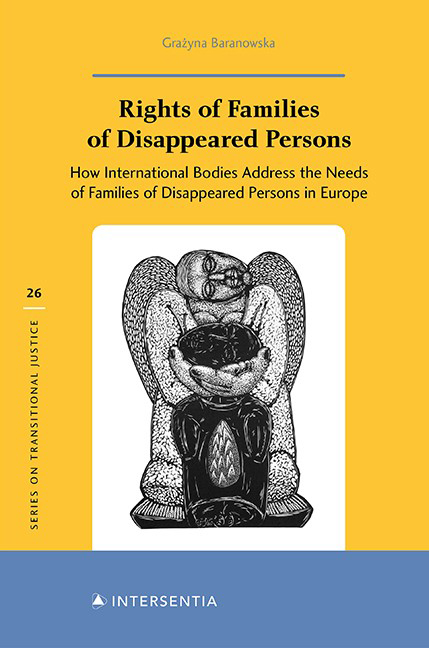Book contents
- Frontmatter
- Acknowledgements
- Contents
- List of Cases
- Chapter 1 Introduction to the Rights and Needs of Families of Disappeared Persons
- Chapter 2 The European Court of Human Rights and Disappeared Persons: Broadening in Substantiating Claims and Narrowing Down Through Application of Temporal Competences
- Chapter 3 The UN Human Rights Committee and Disappeared Persons: Approaches to the Right to Life
- Chapter 4 International Judicial Bodies Established in Response to Conflicts in the Former Yugoslavia: Addressing Mass Disappearances
- Chapter 5 Searching For and Exhuming Disappeared Persons: International Non-Judicial Mechanisms
- Chapter 6 Conclusion: Addressing Rights and Needs of Families of Disappeared Person in Europe
- Index
Chapter 6 - Conclusion: Addressing Rights and Needs of Families of Disappeared Person in Europe
Published online by Cambridge University Press: 10 December 2021
- Frontmatter
- Acknowledgements
- Contents
- List of Cases
- Chapter 1 Introduction to the Rights and Needs of Families of Disappeared Persons
- Chapter 2 The European Court of Human Rights and Disappeared Persons: Broadening in Substantiating Claims and Narrowing Down Through Application of Temporal Competences
- Chapter 3 The UN Human Rights Committee and Disappeared Persons: Approaches to the Right to Life
- Chapter 4 International Judicial Bodies Established in Response to Conflicts in the Former Yugoslavia: Addressing Mass Disappearances
- Chapter 5 Searching For and Exhuming Disappeared Persons: International Non-Judicial Mechanisms
- Chapter 6 Conclusion: Addressing Rights and Needs of Families of Disappeared Person in Europe
- Index
Summary
The main aim of this work has been to analyse how international judicial and non-judicial bodies in Europe address the needs of the families of disappeared persons. The work has explored whether, how, and based on what principles the needs of families of disappeared persons can take the form of a claim based on international human rights law. The four identified needs of families of disappeared persons include: returning the remains of the disappeared person(s); the right to the truth; the acceptance of responsibility by states; and the right to compensation. They have been identified as the four most commonly shared basic and fundamental needs of families in which an adult disappeared many years ago and is assumed to be dead, which is the situation of the vast majority of families of disappeared persons in Europe.
Many enforced disappearances took place in Europe in the second half of the 20th century and at the beginning of the 21st. More than half of these disappearances have not yet been resolved and the families of the disappeared – who are also considered victims of the disappearance under international human rights law – still do not know the fate of their loved ones. At the same time, the phenomenon of enforced disappearances continues to be present in Europe, as can be seen in the conflicts in Chechnya and Ukraine.
The first instruments dealing with enforced disappearances were adopted in the 1990s. In 1992 the UNGA adopted the Declaration on the Protection of All Persons from Enforced Disappearance (Declaration), and the Inter-American Convention on Forced Disappearance of Persons in 1994 (Inter-American Convention). Over a decade later, in 2006, the ICPPED was adopted. These three international human rights instruments contain similar standards. In addition, the Rome Statute of the International Criminal Court, adopted in 1998, establishes the principle that the perpetrators of the gravest international crimes must be held criminally accountable. Enforced disappearances which took place as a part of a widespread or systematic attack against a civilian population are included among grave international crimes.
The establishment of a definition of the crime of enforced disappearance is of utmost significance in protecting the rights of victims thereof.
- Type
- Chapter
- Information
- Rights of Families of Disappeared Persons , pp. 211 - 216Publisher: IntersentiaPrint publication year: 2021



